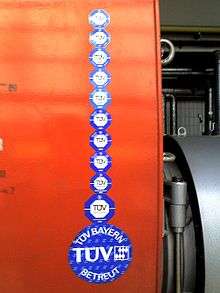Technischer Überwachungsverein

TÜVs (German pronunciation: [ˈtʏf]; short for German: Technischer Überwachungsverein, English: Technical Inspection Association) are German businesses that provide inspection and product certification services.[1]
The TÜVs originated in Germany in the late 1800s during the Industrial Revolution, following the explosion of a steam boiler at a brewery in Mannheim in 1865. This led a group of engineers to found the first Dampfkessel Überwachungsverein (DÜV, Steam Boiler Inspection Association) and soon similar associations were created in other German cities and these came together in an association in 1873. In 1877 they issued the first standards for construction and maintenance of boilers, which became known as the "Würzburg standards". DÜVs took on inspection services for other technologies as they came into use, for example electrical safety testing and elevator inspection. In 1906 the Grand Duchy of Baden issued regulations for vehicle inspection as well as drivers, and the local DÜV was given that responsibility. By 1938 there were 37 DÜVs, and they were reorganized and renamed into 17 TÜVs. In 1951 national regulation obligated people to have their cars inspected by TÜV every two years.[2]
The individual TÜVs became multinational corporations with time, and came to provide services to industry, governments, individuals, and non-profit groups.[3]
During the 1980s and 1990s, deregulation led to competition in the German inspection and certification industry,[4] and further deregulation occurred at the end of 2007.[5]
In 2007, TÜV Nord and TÜV Süd agreed to merge, which would have created a company with 18,000 employees and sales of around 1.8 billion euros; however the companies called off the merger that same year, citing potential difficulties with integration as well as restrictions that would have been required under antitrust law.[6] In 2008 TÜV Süd and TÜV Rheinland agreed to merge which would have created the second largest testing services company in the world, behind SGS S.A.; the combined company would have had around 25,000 employees and 2.2 billion euros in income.[7] These plans were abandoned by August again due to antitrust concerns.[8]
TÜV Nord had 10,000 employees stationed globally as of 2015.[3]
TÜVs function as notified bodies in Europe for medical device regulation.[9] In 2013, TÜV Rheinland was held liable by a French court to 1600 women whose breast implants had ruptured; the implants were made by Poly Implants Prothèses and TÜV Rheinland had certified the manufacturing process.[10][11] TÜV Rheinland had about 1.88 billion euros in revenue in 2015, with more than half generated outside Germany.[12]
See also
- ATEX
- BSI Group
- IEC 61508 – Functional Safety
- CE marking
References
- ↑ Dong, Jielin (2007). Network Dictionary. Javvin Technologies Inc. ISBN 9781602670006.
- ↑ Mayer, Hans W. (15 April 2016). "Wie die Industrie sicherer wurde". VDI Nachrichten.
- 1 2 Hakim, Danny; Bowley, Graham (14 October 2015). "VW Scandal Exposes Cozy Ties in Europe's New Car Tests". The New York Times.
- ↑ Bennet, Gregory S. (2009). Food Identity Preservation and Traceability: Safer Grains. CRC Press. p. 270. ISBN 9781439804872.
- ↑ "Zusammenschluss: TÜV Süd und TÜV Rheinland stehen vor Fusion - SPIEGEL ONLINE - Wirtschaft". Spiegel. February 12, 2008.
- ↑ "Fusion von TÜV Süd und TÜV Nord geplatzt". tagesschau.de-Archiv. 27 August 2007.
- ↑ Dierig, Carsten (17 February 2008). "TÜV Rheinland und TÜV Süd wollen gemeinsam den internationalen Markt erobern: Auch nach dem geplanten Zusammenschluss der beiden Prüfinstitute soll der Standort Köln erhalten bleiben - WELT". Die Welt.
- ↑ "TÜV-Fusion: Elefantenhochzeit abgesagt". Frankfurter Rundschau (in German). 26 August 2008.
- ↑ Labek, G; Schöffl, H; Meglic, M (February 2015). "New medical device regulations ahead - what does that mean for arthroplasty registers?". Acta orthopaedica. 86 (1): 5–6. doi:10.3109/17453674.2014.1002185. PMC 4366659. PMID 25583172.
- ↑ Baume, Maïa De La (14 November 2013). "Court Orders German Firm to Pay Victims of Defective Breast Implants". The New York Times.
- ↑ Leeuwen, Barend van (2017). European Standardisation of Services and its Impact on Private Law: Paradoxes of Convergence. Bloomsbury Publishing. pp. 134ff. ISBN 9781509908356.
- ↑ Bolsmann, Tobias (13 June 2017). "TÜV Rheinland kooperiert mit RAG-Prüflabor in Herne". Westdeutsche Allgemeine Zeitung (in German).